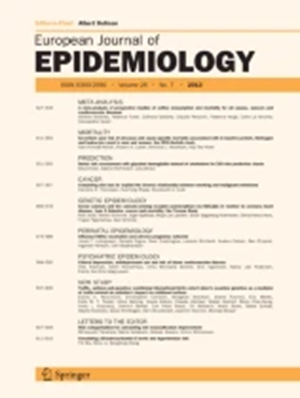用植物性食物部分替代红肉或加工肉与患心血管疾病的风险。
IF 5.9
1区 医学
Q1 PUBLIC, ENVIRONMENTAL & OCCUPATIONAL HEALTH
引用次数: 0
摘要
向更多植物性饮食的转变可能会促进人类和地球的健康。本模型研究旨在评估用植物性食品适度部分替代红肉或加工肉对心血管疾病(CVD)风险的影响。我们使用了来自五个芬兰队列的汇总数据(42,868名年龄≥25岁的参与者,78%为男性)。中位随访时间为12.7年,发生11,031例CVD病例。饮食通过有效的食物频率问卷进行评估。我们模拟了用相应数量的植物性食物代替红肉(100克/周)或加工肉(50克/周)。使用Cox比例风险多变量模型计算特定队列的风险比(HR)和95%置信区间(CI),并对相关混杂因素进行调整,并使用随机效应模型进行汇总。当用蔬菜或植物性食物组合代替加工肉类时,男性心血管疾病风险降低(HR 0.99, 95% CI 0.99-1.00, P < 0.05)。在女性中,当红肉被豆类代替时,心血管疾病的风险增加(HR 1.10, 95% CI 1.01-1.20, P < 0.05)。然而,当对所有队列进行相同时间(7.9年)的随访时,几种植物性食物降低了心血管疾病的风险,当部分取代红肉或加工肉时,没有一种食物增加了风险。即使是一个小的、容易实现的改变,转向更多的植物性饮食,也可能有助于人群的心血管健康。这些发现支持了健康和环境可持续饮食的全球战略。本文章由计算机程序翻译,如有差异,请以英文原文为准。
Partial substitution of red or processed meat with plant-based foods and the risk of cardiovascular disease.
A shift towards more plant-based diets may promote human and planetary health. This modelling study aimed to assess the impact of moderate partial substitution of red or processed meat with plant-based foods on cardiovascular disease (CVD) risk. We used pooled data from five Finnish cohorts (42,868 participants aged ≥ 25 years, 78% men). Median follow-up time was 12.7 years, with 11,031 incident CVD cases. Diet was assessed by a validated food frequency questionnaire. We modelled substitutions of red meat (100 g/week) or processed meat (50 g/week) with corresponding amounts of plant-based foods. Cohort-specific hazard ratios (HR) and 95% confidence intervals (CI) were calculated using Cox proportional hazards multivariate models adjusted for relevant confounding factors and pooled together using a random effects model. There was a suggestive reduction in CVD risk in men when processed meat was substituted with vegetables or the combination of plant-based foods (HR 0.99, 95% CI 0.99-1.00, P < 0.05). In women, there was an increase in CVD risk when red meat was substituted with legumes (HR 1.10, 95% CI 1.01-1.20, P < 0.05). However, when all cohorts were followed for the same length of time (7.9 years), several plant-based foods reduced CVD risk and none of them increased the risk when partially replacing red or processed meat. Even a small, easily implemented change towards a more plant-based diet may contribute to cardiovascular health at the population level. These findings support global strategies towards healthy and environmentally sustainable diets.
求助全文
通过发布文献求助,成功后即可免费获取论文全文。
去求助
来源期刊

European Journal of Epidemiology
医学-公共卫生、环境卫生与职业卫生
CiteScore
21.40
自引率
1.50%
发文量
109
审稿时长
6-12 weeks
期刊介绍:
The European Journal of Epidemiology, established in 1985, is a peer-reviewed publication that provides a platform for discussions on epidemiology in its broadest sense. It covers various aspects of epidemiologic research and statistical methods. The journal facilitates communication between researchers, educators, and practitioners in epidemiology, including those in clinical and community medicine. Contributions from diverse fields such as public health, preventive medicine, clinical medicine, health economics, and computational biology and data science, in relation to health and disease, are encouraged. While accepting submissions from all over the world, the journal particularly emphasizes European topics relevant to epidemiology. The published articles consist of empirical research findings, developments in methodology, and opinion pieces.
 求助内容:
求助内容: 应助结果提醒方式:
应助结果提醒方式:


